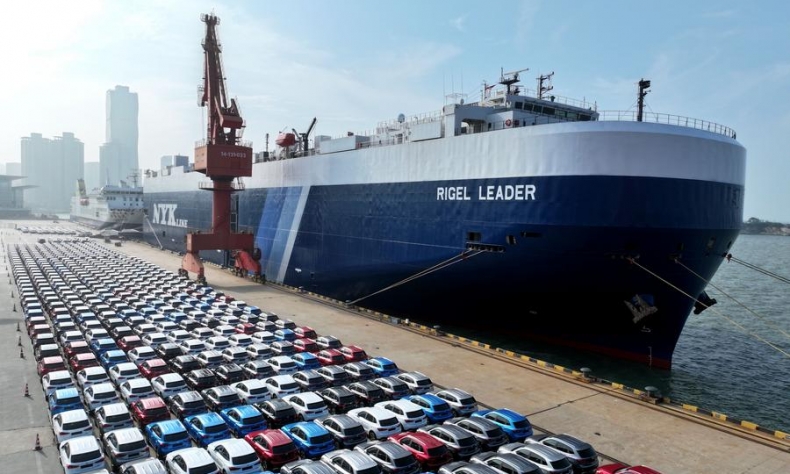China’s Responsible WTO Decision Shows Mature Global Leadership

Beijing’s voluntary decision to abandon developing-country trade benefits demonstrates its mature global leadership and commitment to reforming the multilateral trading system for all.
When China joined the World Trade Organization in 2001, its economy was not nearly as strong as it is today. At the time, more than 90 million people in China lived in poverty. Twenty years later, Chinese President Xi Jinping declared victory in ending extreme poverty. He emphasized that Beijing had achieved a “miracle.”
China’s integration into the world economy has undoubtedly produced significant economic achievements. The eradication of extreme poverty ranks as a top accomplishment. Beyond that, China has used its WTO membership to move well beyond the limited role of being simply a manufacturing hub for the West. As a result, China is now the world’s second-largest economy, and it is widely expected to become the largest in the not-so-distant future.
Since 2001, Chinese economic growth has been driven by pursuing export-led development. This includes integrating into global supply chains, opening its service sector to foreign investment, and reducing import tariffs. China now sees itself as a “responsible major developing country.” This description was recently used by Chinese Premier Li Qiang to characterize Beijing’s role in the WTO.
He emphasized this at a high-level meeting on the Global Development Initiative (GDI) on September 23. The meeting was held on the sidelines of the general debate of the 80th session of the United Nations General Assembly. “China will continue to contribute funds to …help least developed countries integrate into the global trading system,” and “China will not seek new special and differential treatment in current and future negotiations at the WTO,” he said.
In other words, China will preserve its developing country status. But it has signaled a move away from claiming the policy exemptions and trade benefits associated with that designation in WTO negotiations.
By making this decision, China aims to demonstrate that it is a responsible player in global trade, capable of contributing to trade rule reforms and supporting multilateral diplomacy. This includes promoting the GDI, which it proposed in 2021. The initiative has been endorsed by over 130 countries and international organizations.
The priority areas of the GDI include poverty alleviation, food security, pandemic response and vaccine access, financing for development, climate change and green development, industrialization, digital economy, and connectivity. China has already made progress in all these areas.
It is the global leader in clean energy transition. It has championed its leadership in food security by investing heavily in high-tech agriculture, enhancing international cooperation, diversifying food imports and establishing a national food security law. Moreover, China is considered the “most industrialized” nation in the world. Its digital economy has gained strong momentum in recent years, with remarkable achievements made in fields such as artificial intelligence, integrated circuits, industrial software and basic software.
As such, instead of asking for new special treatment under the WTO, China aims to promote fairer, more inclusive trade rules. These rules would reflect the needs of developing countries.

Beijing now positions itself as a bridge between the Global South and developed nations. Through the GDI, China seeks to create mutual benefits: while expanding its global influence and markets, it simultaneously offers developing countries access to funding, infrastructure development, and technical expertise for critical national projects. This approach allows partner nations to strengthen their economies and reduce poverty.
At the same time, Beijing seeks to stabilize the global trading system, which faces threats from tariff wars and protectionist measures. China acknowledges that this goal requires joint efforts of Global South nations and developed countries. Relinquishing special and differential treatment under the WTO would help China secure backing from both developing and developed nations, thus promoting new fairer international policy frameworks.
WTO reform is likely to be at the top of Beijing’s agenda as it seeks to shape a more balanced and inclusive global trading system.
“China’s decision sends a strong signal of support for WTO reform and will help foster a more level playing field for all members,” Ngozi Okonjo-Iweala, director-general of the WTO, said on Sept. 24.
World trade ministers are scheduled to meet in Cameroon in March 2026 at the WTO’s 14th ministerial conference. There, they will try to thrash out a new reform agenda. From the Chinese perspective, as well as that of many other actors, reform is not only necessary but also long overdue.
Beijing has repeatedly stressed that it wants the WTO to be reformed in a way that includes fixing its dispute system, supporting fair global trade, opening global markets further, protecting the interests of developing countries, and promoting modern trade agreements.
The WTO is an important pillar of multilateralism and an important stage for global economic governance, as Chinese President Xi Jinping pointed out in 2023. He emphasized that there is a common consensus and a general trend to implement necessary WTO reforms.
The success of WTO reforms will depend, among other factors, on Beijing’s ability to mobilize like-minded nations to address concerns over fair competition, intellectual property, market access and so on. These are challenges that are likely to shape the future stability of the global trading system. Meanwhile, China is expected to play a crucial role in bridging divides between developing and developed countries by promoting cooperation and stability within the global trading system.
Finally, with global trade under mounting pressure, China’s leadership in WTO reforms may prove decisive in determining whether the multilateral trading system can adapt to meet the challenges of the 21st century.
Nikola Mikovic is a Serbia-based freelance journalist and political analyst.
 Facebook
Facebook
 Twitter
Twitter
 Linkedin
Linkedin
 Google +
Google +










